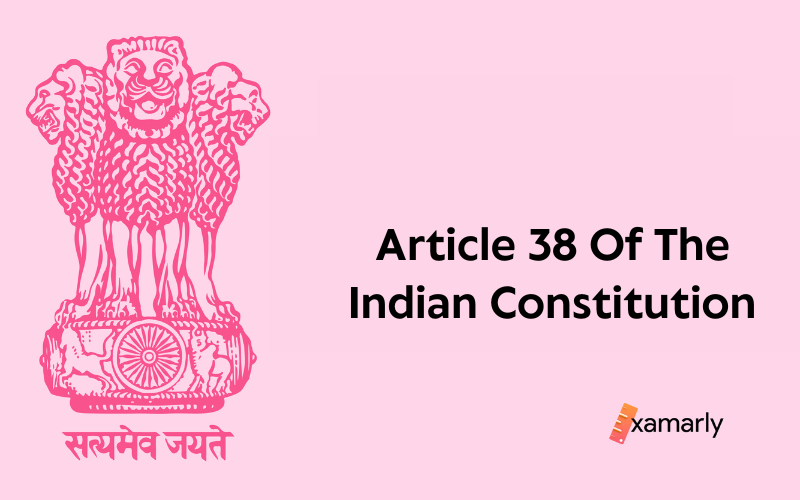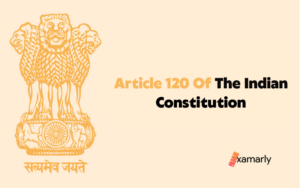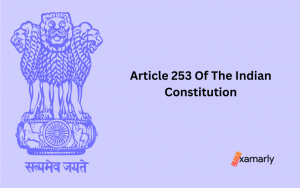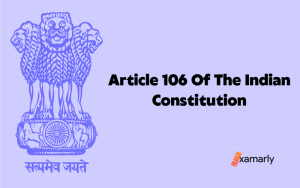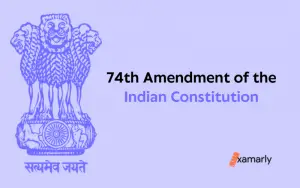Article 38 of the Indian constitution is one of the DPSPs that was one of the pivotal articles to ensure the social well being and the welfare of general public. Let us delve deep into the notion and the motive behind the introduction of this article into Indian constitution.
Background Of The Article 38 Of The Indian Constitution
Article 38 was decked as part of Article 30 of the Draft Constitution of India. This article originally comprised just one sentence, that directed the state to promote the social, economic and political harmony as appropriate to a welfare state in all institutions of national life.
The article’s inclusion in the final Constitution was debated in the Constituent Assembly on November 19, 1948. There was some initial confusion as to how to attain the attempted goal, that is political democracy and economic democracy, as to whether the path adopted by the state would be socialist or communist. A member of the constituent assembly opined that the socialist order to be reached should not fall into the category of DPSPs which are legally non-enforceable because then the Preamble’s vision of building a socialist state would stand contradictory. There was some debate about the moral implications of capitalist order.
However, the Constituent assembly passed this draft article without any amendment. It refrained from commenting on how the state would attain the goal of economic democracy.
Related – State to secure a social order for the promotion of welfare of the people.
To Quote From The Constitution
Article 38 of the Indian constitution is quoted below:
“38. State to secure a social order for the promotion of welfare of the people
(1) The State shall strive to promote the welfare of the people by securing and protecting as effectively as it may a social order in which justice, social, economic and political, shall inform all the institutions of the national life
(2) The State shall, in particular, strive to minimize the inequalities in income, and endeavor to eliminate inequalities in status, facilities and opportunities, not only amongst individuals but also amongst groups of people residing in different areas or engaged in different vocations”.
Salient features of Article 38 Of The Indian Constitution
- It seeks to establish a social order keeping in mind the welfare of people.
- It can be dubbed as a “total” Directive Principles Of State Policy, because it seeks to achieve welfare of not any particular group but the entire Indian population.
- It advocates the prevailing of justice with respect to social, economic and political in all spheres of national life.
- It attempts to minimize the inequalities in income among individuals as well as among groups of people residing in different parts of India or engaged in different vocations. It seeks to find the common denominator of fair wealth and wage distribution.
- It also looks after fairness in distribution of opportunities and facilities.
- It is essentially based on socialist principles.
- Section 2 was included in the existing article 38 by the 44th Amendment of the constitution.
- Forty-fourth Amendment also amended the List of Fundamental Rights.
- Right to Property which was formerly Article 31C was dropped from the Fundamental rights and included as a civil matter. Right to property as a Fundamental right stood in direct opposition to the fulfilment of the objective of article 38 that is the redistribution of wealth. That former fundamental right limited the promotion of Article 38 and was thus dropped, because a fundamental right was definitely more powerful than a DPSP in the eyes of the judiciary.
Read Also – Article 36 Of The Indian Constitution
Significance of the 44th Amendment to the Indian Constitution to Article 38
Forty-fourth Amendment,1978: It added another heading after article, namely Section-2 to Article 38 which declares that; “The State in particular shall strive to minimize economic inequalities in income and eliminate inequalities in status, facilities and opportunities not amongst individuals but also amongst groups”.
Forty-fourth Amendment altered the list of Fundamental Rights reducing it from a count of seven to a count of six. Right to Property was removed from the list of Fundamental Rights (Omission of article 31C Right to Property part) to reduce the scope of the concentration of wealth in just the hands of the elite.
Summing up
In the famous Golak Nath vs the State of Punjab case, it was establishes by the Supreme court of India that the Fundamental Rights definitely held the Transcendental position. However, DPSPs should not be thought as inferior to the FRs because they are non justiciable in any court of law. The DPSPs have played very important role in the formulations of policies by the Government. They form the ultimate guidance book which the state follows when adding or deleting any provisions of an article. Thus, they will continue to play an important role in the building of the identity of India as a nation.
FAQs
1. Mention some of the other important Directive Principles.
Article 42 becomes important in part of gender discourse prevailing nowadays. The state is advised to look after the prevailing conditions in work environment and make provisions for just maternity relief.
Article 43 advises on promotion of Cottage Industries on both individual or cooperative setting in rural India.
Article 44 seeks to secure for the citizen a Uniform Civil Code throughout the entire territorial expansion of India.
Article 48 seeks to improve agriculture, animal husbandry and the environment
Article 51 advises state to attain international peace and security, to foster respect for international law and treaty obligations, and to maintain just and honourable relations with other nations and to encourage settlement of disputes at the global level by arbitration.
2. What was established in the Golak Nath vs State of Punjab case of 1967?
The Supreme Court gave path breaking judgment about adopting a new vision for the scope of the powers of the parliament. The parliament cannot amend the part III of the Constitution which contains the Fundamental rights. The FRs were given the repute of transcendental position.


